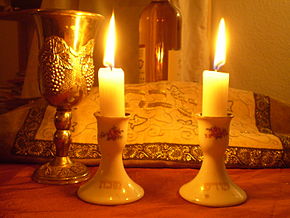In this week’s reading, the Torah talks about Shabbos, the Sabbath. In this case, however, it comes with an unusual introduction. “Speak to the Children of Israel, and say to them the festivals of G-d, which you shall declare, the Holy Convocation — these are my festivals. Six days shall you do labor, and on the seventh day, it is the Sabbath, a holy convocation, all creative labor you shall not do…” [Lev. 23:2-3] Why does the Torah start talking about festivals, and immediately detour into Shabbos?
 One answer, of course, is that the Sabbath is indeed a festival in its own right. But the Ohr HaChayim gives a different answer, especially because the total repeats “these are the festivals of G-d” after this mention of Shabbos, before going through the holidays. As with everything in the Torah, there is no needless repetition; everything has a meaning.
One answer, of course, is that the Sabbath is indeed a festival in its own right. But the Ohr HaChayim gives a different answer, especially because the total repeats “these are the festivals of G-d” after this mention of Shabbos, before going through the holidays. As with everything in the Torah, there is no needless repetition; everything has a meaning.
When the Torah says that these are the festivals “which you shall declare,” it is meant quite literally. When there was a Sanhedrin, it was responsible for declaring each new month based upon eyewitness testimony that the moon had appeared. It also decided in what years a second Adar should occur, in order to keep the holidays in their proper seasons. The calendar only became set when Hillel the Second, descendant of Hillel the Elder, realized that the Sanhedrin would be disbanded due to the exile, and laid out a calendar to be used until it formed once again.
His set calendar is a mathematical marvel. It is based upon an extremely precise calculation of the length of both the lunar and solar cycles, without which we would shortly end up with Pesach in the fall (with apologies to our friends in the southern hemisphere, who experience this each year). This is not because Hillel was a mathematician, but because he received this knowledge from earlier generations. The Sanhedrin always knew when it was possible for the moon to appear, yet relied upon eyewitness testimony as long as it was feasible to do so. Israel, by declaring the festivals, helps create these times each year. It is a partnership between Israel and G-d.
The Ohr HaChayim explains: not so, the Sabbath — and this is why the Torah pauses before beginning to describe the festivals. Otherwise, you might think that if the Sanhedrin says so, the Sabbath can also be put off or moved up a day. The Torah tells us that this is not the case. There is no partnership on this occasion; the Sabbath comes every seven days, “ready or not!”
The same is true when it comes to the complete limitation of creative labor on Shabbos. People sometimes mistranslate “melachah” as “work,” and then wonder why it’s okay for the Rabbi to work harder on Shabbos than any other day, and why it’s not okay to take a trip to the beach. This is because “melachah” is creative labor — changing the world.
The Torah tells us that we cannot change the time of the Sabbath, and on the Sabbath, we cannot make constructive changes in the physical world around us. And because we have an innate need to be constructive, to do something — we are left with the spiritual. The restrictions of the Sabbath force us to look inwards. We can’t change the physical world around us; we can only change ourselves, and say things that help others to change themselves as well.
On Shabbos, you can go in and change the world!




